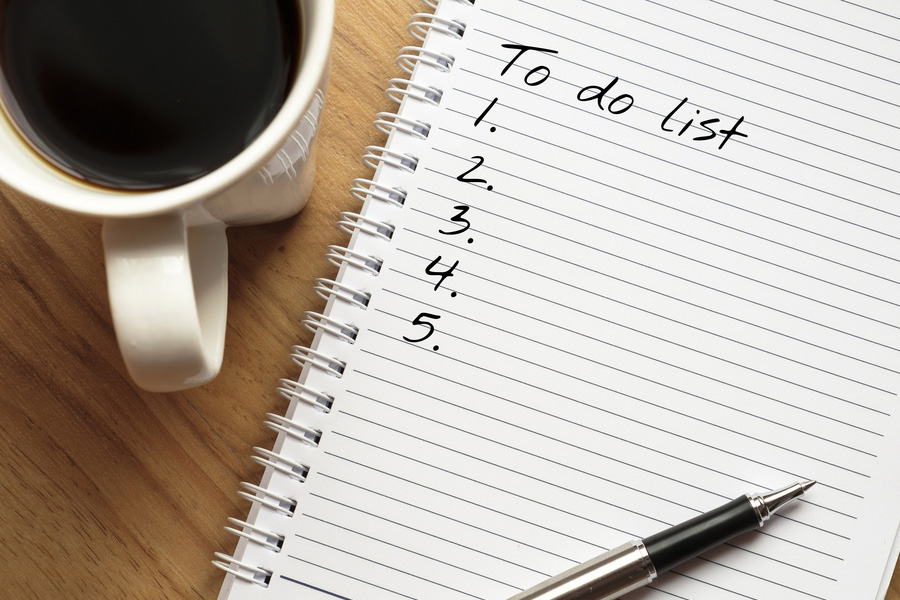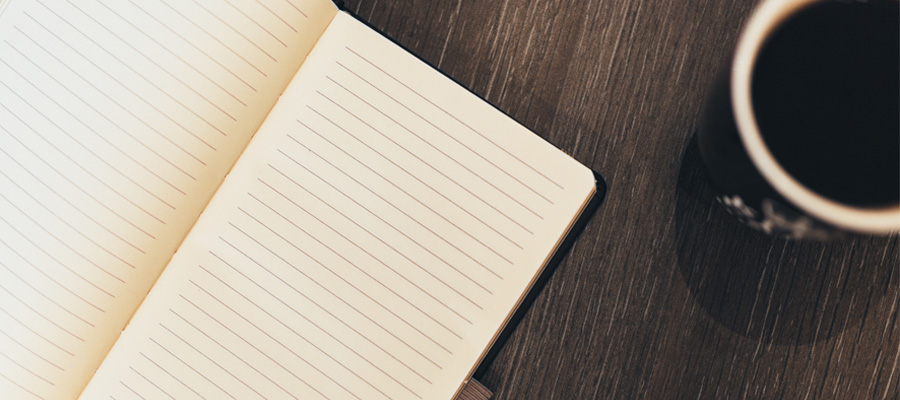The clock is ticking.
We all know that time can’t actually be stopped. But there are a ton of ways to use that time more wisely, and, sometimes, even make it feel like we are stealing more hours than our allotted 24 hour day.
There are countless books, blogs, videos, articles and more geared towards helping you live your best life, be your best you, overcome procrastination, form a routine, etc. So we decided to do some of the work for you, rounding up a list of some of the best productivity advice, so you can start each day more relaxed, and end each day feeling more accomplished than ever. Oh, and be sure to stick around for an added bonus at the end of this post!
1. Set Weekly Goals
We are committed to setting weekly goals each and every Monday morning during our production meeting. It can feel necessary to dive right into tasks at the beginning of the week, but starting without having a path laid out in front of you, while it might feel productive at first, will eventually lead to an aimless workflow.
Each week we set goals for what everyone wants to accomplish that week, so we can use it as a productivity checklist. At the end of each week, we go through each bullet point, talk about if we accomplished it and if not, why not, and we set the goals for the following week. It helps keep everyone in check and moving forward.
–Mackenzie Barth, co-founder and CEO of Spoon University
2. Schedule Everything
Have you ever caught yourself mindlessly clicking back and forth between open tabs in your browser, to an email, to your project management window and back again? Well, maybe it’s just us, but if we’re not working off of a carefully crafted to-do list, there are far too many distractions that will flood our mind and interrupt our work-flow, instead of allowing us to check off one item after the next.

If you want to get it done, put it in the calendar. If a task isn’t in my calendar, then it isn’t going to get done.
–Ariel Briner, co-founder and CEO of Cartesian Co
3. Time Blocking
Depending on the type of work you do, typical days will always look different. But for us, a day in the life at a digital agency must include billable time put in for a variety of clients. And when each client can tend to somehow all take ‘first priority’, it’s easy to jump from one task to another for several different clients. But come end of day, you’ve just accomplished a bunch of 30 minute increments, never allowing your brain to fully dive into any of them. Enter: time blocking.
I put everything in my calendar: meals, email, sleep. On busy days it’s easy to forget about all three of these things. Blocking out time guarantees that, at the very least, I’ll be aware of my ideal schedule when things get crazy. For bonus points, block out an hour each day for exercise.
— Shane Scranton, co-founder of IrisVR
4. Manage Distractions

Between social media alerts, emails, and drive-by visits, people can be distracted dozens or more times per day. Since one study found that people take 25 minutes to resume interrupted tasks (after dabbling, on average, in more than 2 other “work spheres” in the meantime), pushing distractions to predictable times can easily save hours. “Schedule time in your calendar for email/social media or when you will have interruptions,” suggests Murphy. “For example, professors have ‘office hours’ when they expect to be regularly interrupted by students. Is there a time of day when you are regularly interrupted? Plan for it.”
You might also consider more radical solutions. One study found that people spend 47% of their time on the internet procrastinating (indeed, you may be procrastinating now!) That’s why Bailey says that “Whenever I hunker down to work on something important, I almost always disconnect from the internet.”
5. Plan Your Day

Chris Bailey, author of The Productivity Project, spent a year test-driving productivity techniques on his blog, A Life of Productivity. He says that the best tactic he’s found for working intentionally is what he calls the Rule of 3. “At the start of the day, before you start working, you simply step back from your work and ask yourself: by the time the day is done, what three main things will I want to have accomplished?” Figuring out what’s most important keeps you from losing hours as you blindly respond to whatever comes in. It also encourages investing time in high-yield activities such as mentoring new employees.
By thinking through your days, you can also match the right kind of activity to the right time. Deep focused work is best done when you have a lot of energy. “People who are high achievers are ruthless schedulers,” says Wendy Murphy, an assistant professor at Babson College who teaches organizational behavior and management. “When are you most able to focus? Schedule the type of work you need to do during the times you have the most energy to do it.”
6. Wake Up At The Same Time
It’s tempting to sleep in on the weekend to catch up on your sleep. Though it feels good temporarily, having an inconsistent wake-up time disturbs your circadian rhythm. Your body cycles through an elaborate series of sleep phases in order for you to wake up rested and refreshed. One of these phases involves preparing your mind to be awake and alert, which is why people often wake up just before their alarm clock goes off (the brain is trained and ready). When you sleep past your regular wake-up time on the weekend, you end up feeling groggy and tired. This isn’t just disruptive to your day off, it also makes you less productive on Monday because your brain isn’t ready to wake up at your regular time. If you need to catch up on sleep, just go to bed earlier.
7. Don’t Rush in The Morning

We all have those mornings where you’re rushing your morning routine and barely have time to brush your teeth before running out the door to make it to the office on time. It’s when the morning rush becomes a habit that there can be negative consequences to your sense of well being and your overall productivity.
When you start off your day in a frenzied state of mind, you’re not giving your brain any time to decompress, reset, and prepare for the day. Instead, you’re pumping it with adrenaline first thing in the morning, which can cause you to crash later on.
8. Designate Mornings as ‘Me’ Time

It can be difficult to get time to yourself on the weekends, especially if you have family. Finding a way to engage in an activity you’re passionate about first thing in the morning can pay massive dividends in happiness and cleanliness of mind. It’s also a great way to perfect your circadian rhythm by forcing yourself to wake up at the same time you do on weekdays. Your mind achieves peak performance two-to-four hours after you wake up, so get up early to do something physical, and then sit down and engage in something mental while your mind is at its peak.
9. Don’t Tackle the Easy Stuff First
It can be very tempting to get all the easy tasks out of the way first before tackling the tough stuff. This is especially true when you’re dreading that challenging task. You push it further and further down your to-do list … until you’ve left it untouched for days or even weeks.
But tackling the most difficult tasks on your to-do list early on in the day is actually better for your overall productivity. Researchers have found that willpower is a finite resource that steadily decreases throughout the day, according to the book The Willpower Instinct. So your brain is much better at handling the hardest tasks at the beginning of the day when you’re more focused.
Mornings also tend to lend fewer distractions, making it easier for you to get things done. My colleague James Gilbert suggests that folks “take advantage of morning hours to crank through meaty projects without distractions, and save any calls or virtual meetings for the afternoon.”
When you start time blocking and scheduling everything, this becomes easier to do. Well, maybe the task itself isn’t easier. But getting your head in the right space to be able to take the task on will be. You’ve set aside the time, and you can use that as an excuse to ignore any possible interruptions that might try to make their way in.
10. Stop Multitasking
Multitasking can seem inevitable in our modern, ever-connected lifestyles. But research shows it can make us less effective, increase mistakes and stress, and costs the global economy an estimated $450 billion every year.
Think you’re an exception? Consider this: Only 2% of the population is capable of effectively multitasking. For the other 98%, all it does is cause us to be 40% less productive and make 50% more mistakes than non-multitaskers.
11. Don’t Work Through Lunch

Eating at your desk doesn’t just make you antisocial. According to NPR, it’s also “bad for thinking, bad for creativity, bad for productivity, [and] bad for your body.” Sadly, though, only one in five people actually leave their desks or the office for a lunch break.
To be fair, if you’re among those people who take lunch at your desk instead of taking a break, it may not be your fault. Perhaps it’s not built into your office culture, or maybe you have a deadline that’s pressuring you to squeeze every waking moment out of your day.
But research shows taking the midday break can be mentally rejuvenating — and, in many ways, more productive than plugging away at your desk between mouthfuls. The best way to take a lunch break is to remove yourself from your desk or workspace and eat somewhere else — like a cafeteria, restaurant, or public park.
12. Power Naps
One of the biggest perks of working for yourself is not having to worry about face time. You’re actions are responsible for the success or failure of your company — not when you show up or leave work or how long your lunch break is (admittedly, right now these are really early, really late, and nonexistent, respectively). Every so often I dabble in 15 min power naps in the late afternoons, and wake up so much more productive than I could have been otherwise.
— Sathish Naadimuthu, co-founder of Stefan’s Head
13. Get Your Meetings Done More Quickly
One of my favorite tricks is to conduct most of my meetings standing up. I find it to be a much quicker way of getting down to business, making a decision, and sealing the deal. When given the opportunity, I often like to take things a step further–literally, with a walking meeting.
Richard Branson, founder of the Virgin Group
For us, while walking or standing meetings aren’t always a possibility, we never start a meeting without creating an agenda first. We use Do.com as an easy way to add agenda topics with sub-items, and it is easily shared with all participants. While we can’t say that a meeting never goes off topic, it’s definitely helpful for us all.
14. Disconnect
Disconnecting is the most important weekend strategy on this list, because if you can’t find a way to remove yourself electronically from your work Friday evening through Monday morning, then you’ve never really left work.
Making yourself available to your work 24/7 exposes you to a constant barrage of stressors that prevent you from refocusing and recharging. If taking the entire weekend off handling work e-mails and calls isn’t realistic, try designating specific times on Saturday and Sunday for checking e-mails and responding to voicemails. For example, check your messages on Saturday afternoon while your kids are getting a haircut and on Sunday evenings after dinner. Scheduling short blocks of time will alleviate stress without sacrificing availability.
15. Stop Black Hole Browsing
You know the feeling when you search for something on the internet, then click on a “related article” or other link … and before you know it, you’ve charted the entire Russian Revolution?
Yeah … I’ll be the first to admit it: I do this a lot. It’s a dangerous side effect of having a job that requires internet research. It’s one thing to mindlessly browse the web outside of work or when you’re on a break. (In fact, I have a great list of the best sites for wasting time on the internet for times like those.) But it’s another entirely when you’re supposed to be doing actual work.
That’s what Tousley likes to call “black hole browsing,” and it’s become one of the most productivity-sucking psychological addictions out there.
16. Social Media
The whole “easily distracted” thing goes for social media notifications, too. Turns out we actually have a psychological urge to check for social media notifications, which makes it hard to check our News Feeds “just this once” — and usually ends up in a lot of mindless browsing.
As my colleague Scott Tousley says, “We are madly in love with distracting ourselves.”
My colleague Alec Biedrzycki solves this problem by removing all social networks from his toolbar bookmarks. “Even if I don’t mean to browse them, some uncontrollable impulse subconsciously clicks on them when I experience downtime,” he says. “You can get sucked in without knowing it (or even intending to), so eliminating the gateway to those networks keeps me on track.”
Another useful tip is using social media management software for automation capabilities. While this can’t cure the addiction to deliberately checking, scrolling and posting, it can take away some of the perceived need to go on social media multiple times a day because your updates are still being published. Your accounts cannot be fully automated if you want to appropriately and genuinely engage your audience. But you can still post multiple times per day while not having to physically log on each time.
17. Stop Checking Emails As They Come In
Email is supposed to help us do our work, not distract us from our work. So why does it always feel like a productivity suck?
In an effort to stay on top of a constantly overflowing inbox, it can be tempting to check and respond to every email as soon as it comes in. Receiving email notifications in real time certainly doesn’t help. But constantly switching tasks between work and email can really hurt your productivity.
18. Pursue a Passion

You might be surprised what happens when you pursue something you’re passionate about on weekends. Indulging your passions is a great way to escape stress and to open your mind to new ways of thinking. Things like playing music, reading, writing, painting, or even playing catch with your kids can help stimulate different modes of thought that can reap huge dividends over the coming week.
19. Take a 30 Day Challenge
Being stuck in a rut can lead to decreased productivity. Matt Cutts argues in his TED Talk that taking a relatively short, doable 30 Day Challenge can help in some pretty big ways. You can add a new habit, or subtract a bad one, and see where it takes you even after the 30 days are done.
A few takeaways he found was that time became much more memorable, his self confidence grew, and he was able to do things he assumed he never could.
Watch the video, and think of what you could try for your 30 Day Challenge!
20. Listen, Really Listen
One of the sad consequences of being constantly distracted is the epidemic of only half paying attention — and thinking that’s OK. You might think that any time someone else is talking and you’re not, that means you’re listening. But, as my colleague Andrew Quinn wrote in his post on bad conversational habits, it doesn’t. “The real question is who are you listening to when [someone else] is talking,” he wrote. “I’m willing to bet a good portion of the time, you’re actually listening to the voice in your head.”
That, or you’re reading that email that just came in. Or checking to see why your phone buzzed. When you’re in a meeting, how much can you really be paying attention when your laptop is open?
Not only can not listening carefully cost you relationships, it can also cost you in the time it takes to make up for whatever information you missed. Becoming an active listener is a critical part of becoming more emotionally intelligent. This mean really, truly paying attention to what people are saying — and it’s a skill that’ll set you apart in both your professional and personal life.
BONUS Infographic!
We’ve covered the concept of a few of these tips throughout the list above, but for all you visual learners out there, here’s a beautifully designed infographic created by Hubspot that gives even more great productivity tips!


